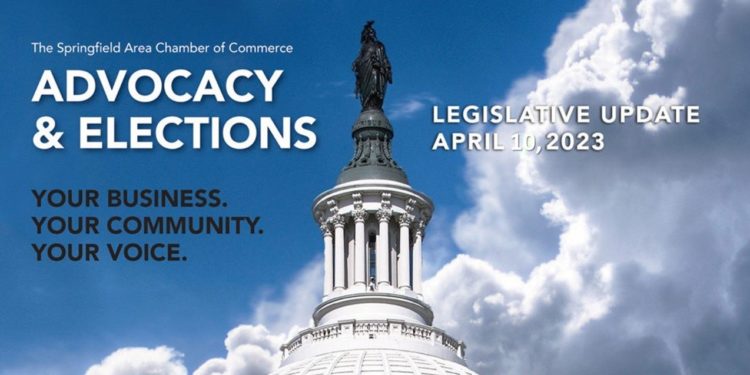Legislative Update: April 10, 2023

We’re monitoring Oregon’s 2023 legislative session for issues of impact and interest to our members. Here’s the latest update from our legislative counsel at the Oregon State Chamber of Commerce (OSCC).
We are now past the halfway point of the 2023 session. The April 4th deadline proved effective in killing several hundred more bills. The playing field for the “homestretch” of the legislative session is now pretty well defined.
By our count, about 1,500 of the total 3,000 bills in circulation have died.
Of the 1,500 bills still alive, we see an enormous number of bills with large financial impacts piling up in the Ways and Means Committee. And with a more limited pot of discretionary money available this biennium, there will be intense lobbying and horse trading late in session as legislators try to get their pet projects funded. But again, most of these will not survive.
General outlook
Generally speaking, we are forecasting that the 2023 session will pose few changes or challenges to general business operations in Oregon. With some exceptions, almost no big anti-business bills have survived to date – they have either been watered-down or died altogether.
State Budget
As is stands right now, the state budget is balanced. The legislature has the money it needs to pay its bills and keep state government operating on current service levels. However, there is not a lot of room to maneuver. With the notable exception of SB 976, there has been no call for additional tax revenue by either the legislature or Governor.
Early Legislative Priorities
The legislature to date has prioritized housing policy and funding to address homelessness (HB 2001) with nearly $200 million of additional investment. In addition, the legislature has largely galvanized around a very modest proposal to incentivize semiconductor manufacturing (SB 4) with another $200 million of state investments designed to attract a portion of the $50 billion contained in the federal CHIPS Act.
Issues of Contention
We are seeing the majority Democrats use their political muscle to push through progressive policies with a more indirect nexus to business policy.
The House will focus on access to abortion and gender-affirming services (HB 2002) as well as some gun control measures (HB 2005). The Senate appears focused on additional rent control policies (SB 611) as well as a re-write of the Measure 114 gun control measure (SB 348). We remain concerned about the steady march toward a single payer health system in Oregon that inches forward with SB 704 and SB 1089.
But overall, are not seeing an aggressive partisan push on business policies as we’ve seen in the past.
OSCC Issues
Employer Liability for Workplace Bullying (SB 851): This bill was amended down to direct BOLI to prepare a model ‘respectful workplace’ policy that employers can adopt. OSCC no longer opposes the bill.
Expanded Right to Refuse Dangerous Work (SB 907): SB 907 was amended down to make Oregon’s current “right to refuse work” law consistent with the federal law. OSCC no longer opposes the bill.
Mandatory Pay Disclosures for Job Postings (SB 925): SB 925 would have required employers to disclose pay range and employment benefits within all job postings. Failure to do so would subject an employer to a lawsuit or employment claim. SB 925 is now dead.
Expanded age discrimination liabilities (HB 2800): HB 2800 layers added complexity into Oregon’s existing age discrimination laws by compromising employers’ ability to consider experience and by requiring employers to bear burden of proof that age discrimination did not take place for adverse employment decisions. HB 2800 is now dead.
Risk-based premium setting (HB 2920): Many OSCC members were concerned about this bill which would disallow insurance companies from considering credit history, criminal history and other factors when determining auto insurance premiums. HB 2920 is now dead.
Elimination of Natural Gas in Residential Housing (HB 3152): HB 3152 phases out the use of natural gas in the residential housing sector. It prevents line extension allowances for new gas line extensions that support the use of gas in residential buildings. HB 3152 is now dead.
First party lawsuits on insurance claims (HB 3242 and HB 3243): Allows policy holders to sue their insurance companies for bad faith. These bills have been tried in other states and have benefitted few but resulted in significant premium spikes in commercial policies for all. These bills passed the House on party-line votes. OSCC will oppose these bills in the Senate.
DEQ Title V permit fees (HB 3229): This bill is a massive 80% increase in Title V air emissions fees implemented by DEQ. Will hurt local manufacturers as permit costs are increased to save DEQ regulator positions. The bill also allows DEQ to raise additional fees without legislative approval. We believe this bill will advance for further discussion.
Other bills still alive the OSCC supports include:
Increased estate tax exemption (HB 2426): Legislators are starting to express concern that Oregon’s estate tax is being levied on middle income Oregonians due to high real estate values.
Increased CAT Tax exemption (HB 2433 / SB 127): OSCC continues to be optimistic that a solution can be found that would increase the CAT tax threshold to as high as $5 million from the current level of $1 million.
Hiring and Retention bonuses (HB 3205): This bill would allow employers to begin to offer hiring and retention bonuses again as current state pay equity laws have made these bonuses legally tenuous. This bill will advance. Alignment of Employee Leave Policies (SB 999): This bill undertakes the work of aligning disparate employee leave policies (OFLA, FMLA, and Paid Leave) to ensure that these laws do not allow employees to “stack” these protected leaves.
The Springfield Chamber of Commerce will be publishing the OSCC’s legislative updates weekly, or as received. Any opinions expressed or implied are those of OSCC and do not necessarily reflect those of the Springfield Chamber or its representatives. If you’d like more information, please visit our Advocacy & Elections Page.
Discover more from Springfield Bottom Line
Subscribe to get the latest posts sent to your email.





